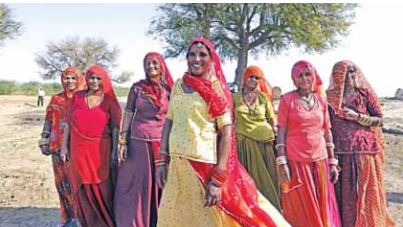The ‘Friends of Water’ restore and revive traditional local water sources in the arid northwestern Indian state
Beneath the sprawling canopy of a ‘khejri’ (Spunge) tree in Kanasar village, in the northwestern Indian state of Rajasthan, a group of women adorned in vibrant attire sing a heartfelt song about water and its significance. Their colourful clothes mirror their unwavering resolve to transform their lives by reviving and conserving a ‘nadi’, a traditional water body in their village in the Bap block of the Phalodi district. The women’s song is a poignant tribute to the life-giving water body.
“I am filling water in my pitcher. It is so heavy that I can’t lift it. This pond is like a sea. Who dug the pond? My father and my brother dug it.”
The lyrics narrate the efforts of the men in digging the pond and the women who shoulder the responsibility of fetching water, painting a vivid picture of their collective struggle and resilience. These women are members of ‘Jal Sahelis’, or Friends of Water, who emerged as the unsung heroes of their community – a title they earned through their relentless efforts and unwavering determination. Led by forty-year-old Leela Khatun, the team’s mission was to restore a traditional pond, known locally as ‘nadi’ or ‘talaab’, that had once been the lifeblood of their village.
In the rural, arid heartland of Phalodi, villagers have witnessed a dramatic shift in rainfall patterns over the past three decades. The once predictable and uniform rainfall has become erratic, leaving some villages dry while others face extreme rain. This change, attributed to climate change, has profoundly impacted their livelihoods and their relationship with nature. Like many parts of the country, Phalodi’s pre-monsoon showers have dwindled, but the monsoon rain has increased, keeping the village pond full year-round. The revival of the village pond has not only restored the land but also instilled drought-resilient practices among the villagers. The Jal Sahelis didn’t stop at restoring water bodies. They mobilised their fellow villagers towards a common goal—achieving domestic water security.
The Jal Sahelis’ work extended beyond restoring the pond. They became advocates for water conservation, educating their community about the importance of preserving this precious resource. Their efforts were not in vain. The rejuvenated pond gave the village a new lease of life and ensured a steady water supply for their homes. Their tireless work earned them another title—the ‘Water Warriors’.
This change in weather patterns is not just a statistic for the villagers but a reality that underscores the urgent need for climate action. Rain, once a reliable ally, has become an unpredictable force, shaping their lives in ways they never imagined. Amid the harsh realities of climate change, the villagers have turned to their ancestral wisdom. They’ve revived their traditional water harvesting systems, a reliable lifeline in these changing times. As temperatures rise and groundwater levels fluctuate, drought risk looms large. But the villagers stand undeterred.
Recognizing the importance of maintaining the traditional water resources and taking advantage of the increased rainfall in Phalodi, the Jal Sahelis , in 2021, took the responsibility of reviving the pond with the support of the local Non-Government Organization Unnati.
The villagers came together and pooled money to save the centuries-old pond. The Sarpanch (Elected village head) and the villagers contributed INR 1.5 million (USD 18,000) for pond restoration and put in place guidelines for its upkeep. Part of the funds came from the Mahatma Gandhi National Rural Employment Guarantee Act (MGNREGA).
Source:
UNICEF India
‘Jal Sahelis’ Lead Water Conservation Efforts in Rajasthan






